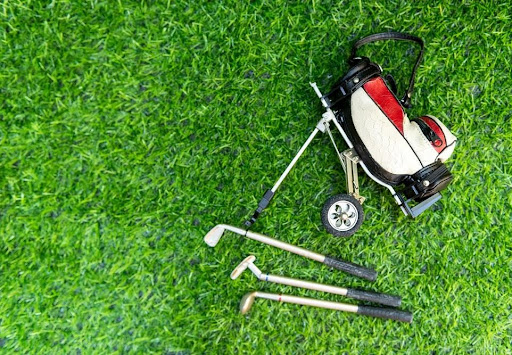Importance of Proper Gear in Preventing Golf Injuries

Golf is often perceived as a gentle sport, yet players are not entirely free from the risk of injuries. Injuries in golf typically stem from incorrect techniques and excessive force, while unsuitable or poorly chosen equipment can exacerbate these problems. From your golf cart to your clubs, every piece of equipment should match your skill level and enhance your movements. In this discussion, we explore strategies for preventing golf injuries and how selecting the appropriate gear can safeguard you while optimizing your performance.
Golf Carts and Bags to Minimize Strain
Transporting a cumbersome golf bag across 18 holes can burden your legs and lower back. Opting for a golf cart lessens this physical stress and helps conserve energy, especially during lengthy or hilly rounds. Quality golf carts, such as those offered by certain companies, can be pivotal in preventing injuries, allowing for rest between shots and reducing muscle and joint overuse. For individuals with mobility issues or those recuperating from injuries, these carts offer a means to stay engaged without risking further harm.
Similarly, lightweight and ergonomically designed golf bags with padded straps help evenly distribute weight across your shoulders, which is beneficial if you are susceptible to back pain.
Golf Gloves for Grip Stability and Hand Protection
The constant swinging in golf may cause blisters, calluses, and wrist discomfort, especially if your grip is unstable. Well-fitted golf gloves are crucial, improving your grip while helping to ward off injuries like tendonitis and carpal tunnel syndrome. Extra padding in the palm and fingers offers comfort and reduces friction, thereby preventing bumps and swelling. Choose gloves that fit well—snug but not overly tight—and are made of breathable materials.
Golf Shoes for Enhanced Traction and Stability
Your stance, swing, and balance in golf heavily rely on proper footwear. Since golf involves extensive walking and prolonged standing, choosing the right shoes can significantly aid in preventing injuries to your feet, ankles, knees, and lower back. Golf shoes with adequate arch support help distribute your weight and absorb impact, reducing stress on your feet and preventing issues such as metatarsal pain. It is equally vital to have shoes with reliable traction, such as those with spikes or specially designed soles, to prevent slipping on wet courses. For golfers with specific foot conditions, like flat feet or high arches, custom orthotics can be added to provide added support or comfort.
Golf Clubs for Correct Posture
A key factor in preventing golf injuries is using clubs tailored to your size, strength, and swing speed. Ill-fitting clubs can compel you into unnatural postures, exerting excess strain on your joints and muscles. Clubs that are too long may cause you to hunch, while those too short may lead to overextension. Heavy clubs might offer more power but can stress your wrists, elbows, and shoulders over time. For those prone to injuries, consider opting for lighter clubs that offer control without demanding excessive effort.
Furthermore, the grip width of your clubs influences the prevention of wrist and elbow injuries. Small grips might lead to over-gripping, causing golfer’s elbow, while overly large grips can restrict wrist movement. Select grips that feel comfortable, allow a natural swing, and fit your playing style.
Stay Safe and Enhance Your Game
While golf is a delightful and fulfilling sport, it carries the possibility of injury like any physical activity. The decisions you make concerning your equipment—whether it involves using a golf cart, gloves, shoes, or clubs—are crucial in minimizing common health risks. Investing in quality, well-fitted equipment can improve your performance and help you remain injury-free on the golf course.



